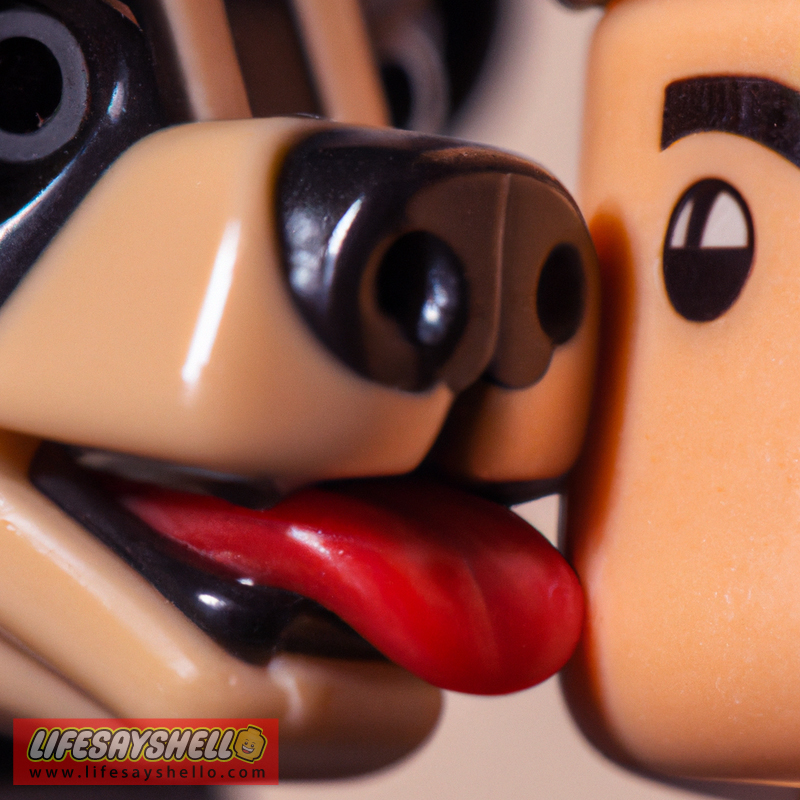Why Is My Dog Coughing So Much Lately?

If your furry friend has been hacking, honking, and heaving more than usual lately, you're probably worried and wondering why. A coughing dog can keep you up at night with all that bothersome barking, and leave you feeling concerned about their health and comfort. But don't worry - there are several common reasons why dogs develop coughs, ranging from mild to severe. By understanding the underlying causes, you can get your pup the right treatment and relief.
Kennel Cough - The "Doggy Cold"
One of the most common causes of coughing in dogs is kennel cough, which is basically the doggy equivalent of a cold for humans. Kennel cough is a highly contagious respiratory infection that spreads easily where dogs meet, like kennels, dog parks, groomers, and shelters.
The main symptom of kennel cough is a dry, honking cough that sounds like your pooch has something stuck in their throat. It's often worse at night or when excited. Kennel cough is caused by bacteria or viruses that infect the trachea and upper respiratory tract.
Dogs with kennel cough usually develop symptoms 3-14 days after exposure, and the cough can last 1-4 weeks depending on immune function. Most cases resolve on their own as the immune system fights it off. But kennel cough can progress to pneumonia, especially in young puppies, older dogs, or immunocompromised pups.
To treat kennel cough at home, make sure your dog gets plenty of rest and fluids. You can also use a humidifier to soothe their throat and ask your vet about safe cough suppressants. Since kennel cough is so contagious, isolate your infected pooch for a few weeks until the cough resolves. With rest and TLC, your pup will be back to their happy, energetic self in no time!
Fluid in the Lungs from Heart Disease
Sometimes a cough is a sign of an underlying heart condition in dogs. As heart disease progresses and the heart struggles to pump properly, fluid can back up into the lungs. This causes inflammation, congestion, and makes your dog cough as their lungs try to expel the excess fluid.
Coughs related to heart disease tend to be chronic, meaning they last for weeks or months rather than days. Dogs with heart disease may also seem lethargic or exercise intolerant. Panting and rapid, labored breathing are other signs. Only a veterinarian can diagnose heart disease through x-rays, bloodwork, ECG, and ultrasound.
Treatment depends on the type and severity of the heart disease. Options include medications like ACE-inhibitors, diuretics, and vasodilators to remove fluid, improve heart function, and widen blood vessels. Oxygen therapy may help, and advanced cases may require surgery. With early intervention, many dogs with heart disease can live happy lives for years!
Pneumonia - A Serious Lung Infection
Pneumonia is another common cause of coughing in dogs. It's an infection of the lungs, usually caused by bacteria, viruses, or inhaled fungi and yeast. Pneumonia causes the lungs to fill with fluid and inflammatory cells, making it difficult for dogs to breathe. It can be life-threatening if not treated promptly with antibiotics and supportive care.
Dogs with pneumonia will usually cough up thick mucus or phlegm. They often run a fever, seem lethargic, and have labored breathing. Pneumonia usually develops rapidly, over just a few days. Take your dog to the vet at the first signs for evaluation and treatment. Most dogs recover fully within a few weeks with antibiotics and rest.
Allergic Coughs from Dust, Pollen, and More
Just like humans, dogs can develop allergic reactions to things like dust mites, mold, pollen, and other environmental irritants. Inhaling these allergens causes inflammation in the airways, making dogs cough and "reverse sneeze" as they try to expel the irritant.
Allergy coughs tend to be chronic since dogs are exposed to allergens regularly. You'll notice more coughing during allergy seasons. Treatment involves identifying and avoiding the trigger as much as possible through air filters, medication, etc. Your vet may prescribe antihistamines or steroids to reduce airway inflammation and stop the cough.
Other Causes of Coughing in Dogs
Coughing can also indicate:
Foreign object stuck in the throat - like a bone, toy, or stick. Requires emergency removal by vet.
Collapsing trachea - a condition where the windpipe collapses and blocks airflow. More common in small breed dogs.
Fungal infection - valley fever, blastomycosis, histoplasmosis, etc. Need antifungal meds.
Parasites - like heartworms or roundworms. Treated with dewormers.
Tumors or cancer - like lymphoma. Diagnosed via biopsy.
Foreign object stuck in the throat - like a bone, toy, or stick. Requires emergency removal by vet.
Collapsing trachea - a condition where the windpipe collapses and blocks airflow. More common in small breed dogs.
Fungal infection - valley fever, blastomycosis, histoplasmosis, etc. Need antifungal meds.
Parasites - like heartworms or roundworms. Treated with dewormers.
Tumors or cancer - like lymphoma. Diagnosed via biopsy.
Nasal mites - microscopic mites that irritate the nasal passages and trachea. Treated with antiparasitic medication.
Distemper - highly contagious viral disease that causes coughing and pneumonia. Prevent with vaccination.
Smoke or chemical inhalation - remove dog from the irritating environment.
Laryngeal paralysis - when the cartilage collapse over the larynx, causing airway obstruction and coughing. May require surgery.
Tracheal collapse - weakening of the tracheal rings. More common in small breed dogs.
When to See the Vet for a Coughing Dog
While mild coughing that resolves in a few days may not require a vet visit, it's important to contact your veterinarian if:
- The cough lasts more than 7-10 days
- Your dog seems very ill or has trouble breathing
- They have a fever above 103 F
- They are lethargic and have no appetite
- They cough up blood-tinged sputum or vomit
- The cough worsens or changes
- They have other symptoms like collapsing or diarrhea
Puppies and older dogs may need veterinary attention sooner, as they are more vulnerable to complications from respiratory infections, pneumonia, kennel cough, and other problems that cause coughing. Don't wait - it's better to have your vet evaluate your dog sooner rather than later if their cough doesn't seem to be improving or is getting worse.
Your vet will do a physical exam and may recommend:
- Bloodwork to check for signs of infection or underlying conditions
- Chest x-rays to visualize the lungs and heart
- A tracheal wash or bronchoalveolar lavage to collect airway cells and fluid for analysis
- Endoscopy to examine the upper airways
- Ultrasound of the heart to check for problems
These tests help identify the cause of your dog's cough, whether it's heart disease, pneumonia, a foreign object, fungal infection, or something else. Your vet will prescribe appropriate medication and follow-up care instructions. With proper treatment guided by your vet, your pup will be breathing easy again soon!
Treating Your Dog's Cough at Home
In addition to specific treatment prescribed by your veterinarian, there are some general things you can do at home to soothe your coughing canine and help them feel better:
Make sure your dog rests in a warm, calm environment. Walks and playtime may need to be limited to allow their body to heal.
Keep your dog well-hydrated with fresh water available at all times. You can also offer low-sodium chicken broth.
Use a humidifier to add moisture to the air, which can help soothe irritated airways.
Avoid exposure to smoke, dust, pollen, or anything else that could irritate your dog's respiratory system.
Clean any discharge from your dog's eyes or nose gently using a warm, damp cloth. Don't let it crust over.
Give cough and cold remedies ONLY under your vet's direction, as many OTC human medications are unsafe for dogs.
With rest and tender loving care guided by your vet's treatment plan, you should start to see improvement in your dog's cough within a few days to weeks. However, contact your vet promptly if their condition seems to worsen or not improve as expected. If caught and treated early, most causes of dog cough can be managed for a good quality of life!
When to Worry About a Coughing Dog
While coughing is usually not an emergency, there are some signs that warrant urgent veterinary care:
- Coughing up blood-tinged fluid or vomit
- Very rapid breathing or extreme difficulty breathing
- Blue-tinged gums or tongue
- Collapsing episodes
- High fever above 104F
- Signs of choking - gagging, pawing at the mouth, extreme distress
If your dog shows any of these symptoms along with coughing, call your vet or emergency clinic immediately, as it could indicate a life-threatening problem needing quick intervention. These include:
- Blocked airways from a foreign object
- Pneumonia or other severe lung infection
- Heart failure
- Internal bleeding
Don't wait - get veterinary care right away if your dog's cough seems severe or they are in respiratory distress. Speedy treatment greatly improves the chances of recovery.
When Coughing is Normal in Dogs
It's important to note that not all coughing in dogs is cause for concern. Some temporary, mild coughing can be normal:
- After eating or drinking too quickly
- With excitement or exertion
- When pulling on leash during walks
- Due to throat irritation or swallowing wrong
- With gagging or trying to vomit
- From post-nasal drip or mucus in throat
If the coughing resolves on its own within a day or so, your dog seems otherwise healthy, and they are eating/drinking/playing normally, it's less worrisome. But if coughing becomes chronic or progresses, do get your vet's advice just to be safe. Don't ignore it!
Coughing is your dog's way of trying to expel something that is irritating their airways or lungs. While it may keep you up at night, try to remember that it's not your pup's fault that they are coughing. They don't enjoy it any more than you do! With tender loving care and proper treatment, your furry friend will be breathing easy again soon.
Listen to Your Dog's Cough for Clues
Paying attention to the type of cough your dog has can provide clues to the underlying cause:
A dry, hacking cough may indicate kennel cough or a foreign object lodged in the throat.
A wet, gurgling cough can signal fluid buildup from heart disease, pneumonia, or a serious infection.
A honking cough worse with pressure on the trachea may mean collapsing trachea.
A choking cough along with gagging could mean something is blocking the airway.
Coughing brought on by exercise may indicate heart disease.
Coughing triggered by allergens points to allergic airway inflammation.
Discuss the nature of your dog's cough with your veterinarian, as it will help them narrow down a diagnosis and appropriate treatment. Don't just dismiss your dog's cough as nuisance behavior. Listen closely, because their cough is trying to tell you something!
When to Rest Easy About Dog Coughs
While chronic or worsening coughs always warrant veterinary attention, you can generally rest easy if your dog has:
An occasional cough that resolves on its own
A mild kennel cough that improves steadily
Allergy coughs during pollen season that respond to medication
Coughing only due to excitement or eating too fast
A heart disease cough that is controlled well with medications
A cough that has been thoroughly evaluated and treated by your vet
No other symptoms like lethargy, appetite changes, or breathing issues
Monitor your dog's symptoms closely even if the cough seems minor. But try not to panic or lose sleep over every throat clear - some transient coughing is perfectly normal for our four-legged friends!
When to Take Action for a Coughing Dog
While most causes of dog cough can be treated successfully, it's important not to delay medical attention if your pup's cough lingers or gets worse. The sooner treatment is started, the better the outcome will be! Contact your vet promptly if your dog's cough:
- Lasts more than 7-10 days
- Worsens or changes instead of improving
- Is accompanied by other symptoms like fever, lethargy, or breathing issues
- Interferes with their eating, drinking, or sleeping
- Makes them appear very uncomfortable or distressed
- Contains any blood, vomit, or unusual discharge
Trust your instincts - you know your dog better than anyone. If their cough has you concerned, have it checked out sooner rather than later. With the right treatment guided by your veterinarian, your beloved pup will be back to their happy, energetic selves in no time. Their coughs will fade, and your worries will too. Breathe easy knowing your furry friend is on the mend!




Comments